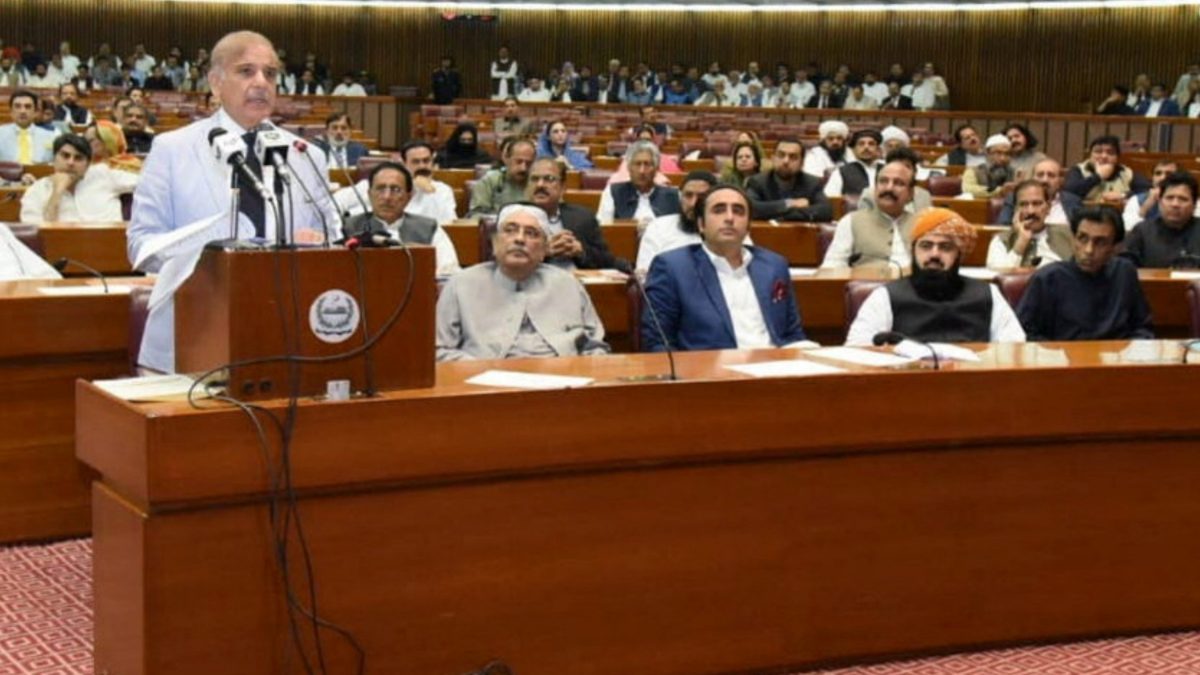Pak Parliament Passes Resolution for Holding Simultaneous Polls, Bill Curtailing CJP’s Powers

The Shehbaz Sharif-led govt made two important moves in the SC by passing a resolution and a bill that defies the orders of Pakistan’s top court (Image: Reuters/Representative)
The resolution and the bill were both rejected by the PTI as they claimed that the govt was preventing the judiciary from functioning independently
The Pakistan National Assembly on Monday in a joint sitting adopted a resolution which stressed on holding general elections of the National Assembly and the other provincial assemblies simultaneously. The Pakistan parliament said the move will “strengthen the federation”, according to a GeoTV.
Two identical resolutions were passed by Pakistan’s federal minister for parliamentary affairs Murtaza Javed Abbasi and senator Kamran Murtaza. The resolutions were aimed at promoting political stability and fostering unity among the provinces.
These resolutions argued for organising general elections of all the assemblies simultaneously and setting up neutral caretaker frameworks to ensure fair and impartial polls.
It said that holding separate polls in Punjab province will impact the outcome of the general elections to the National Assembly seats in Punjab, the GeoTV report said.
Punjab province has over 50% of the National Assembly seats and is the largest federating unit, the report added and warned that holding separate polls would marginalise the smaller provinces’ role in the federation.
Senators of the Imran Khan-led Pakistan Tehreek-e-Insaf (PTI) reacted by staging a token walkout from the house in protest.
The resolution was placed before the NA days after the three-member bench — led by Chief Justice of Pakistan (CJP) Umar Ata Bandial and comprising Justice Munib Akhtar, and Justice Ijaz Ul Ahsan declared that Election Commission of Pakistan’s (ECP) decision to delay the election in Punjab and Khyber Pakhtunkhwa was an “unconstitutional” move.
The top court has asked the ECP to hold elections in the province on May 14 and directed the government to provide funds to the ECP for holding the polls.
The ECP cited resurgence of terror attacks, a shortage of security personnel and an unprecedented economic crisis as reasons for postponement of elections to
October 8, instead of April 30.
However, the coalition government led by Pakistan Prime Minister Shehbaz Sharif rejected the top court’s decision. The coalition government’s finance minister Ishaq Dar also tabled a bill in both houses of the parliament — National Assembly and Senate — seeking funds for the general elections.
The PTI rejected the government’s stance and claimed that the government does not have the authority to dismiss a court order. Dissolution of Punjab and Khyber Pakhtunkhwa assemblies happened in January on the orders of Imran Khan. Khan’s party, the PTI, then demanded the elections be held across the country but Shehbaz Sharif rejected the idea.
Bill Curtailing Powers of CJI Passed
The federal government also passed the Supreme Court (Practice and Procedure) Bill, 2023, passed in the joint session of parliament during the joint session of the parliament. The bill aims to curtail the chief justice’s suo motu powers, the GeoTV report said..
Pakistan law minister Azam Nazeer Tarar presented the SC bill in the joint sitting of the house. Pakistan President Arif-ur-Rehman Alvi returned the bill for reconsideration to the parliament as per the provisions of the Pakistani Constitution.
The President highlighted that the bill “prima-facie travels beyond the competence of parliament and can be assailed as colourable legislation”. The bill aims to curtail the chief justice of Pakistan (CJP) powers to take suo motu notice and the formation of benches, the GeoTV report said..
Tarar defended his bill and said there were voices against the chief justice’s suo motu powers within the Supreme Court. In the bill the government gave the power to a three-member committee comprising senior judges, including chief justice. The bill aims for transparent proceedings in the top court and includes the right to appeal.
The bill also said that “every cause, matter or appeal before the apex court would be heard and disposed of” by a bench of senior judges comprising the chief justice of the Pakistan Supreme Court and the decisions will be taken by a majority.
Read all the Latest News here
For all the latest world News Click Here


